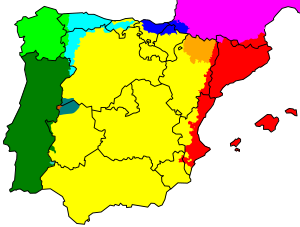lingvo.wikisort.org - Language
West Iberian is a branch of the Ibero-Romance languages that includes the Castilian languages (Spanish, Judaeo-Spanish, Extremaduran (sometimes) and Loreto-Ucayali), Astur-Leonese (Asturian, Leonese, Mirandese, Extremaduran (sometimes) and Cantabrian),[1][2] and the descendants of Galician-Portuguese (Portuguese, Galician, Eonavian, Fala, Minderico, Cafundó, and Judaeo-Portuguese). Pyrenean–Mozarabic (Aragonese and Mozarabic) may also be included.
It has been suggested that Castilian languages be merged into this article. (Discuss) Proposed since May 2022. |
| West Iberian | |
|---|---|
| Western Iberian Romance | |
| Geographic distribution | Iberian Peninsula, Latin America, Africa, Israel, Philippines, East Timor, Easter Island, Goa |
| Linguistic classification | Indo-European |
| Subdivisions |
|
| Glottolog | west2838 |
 Languages of the Iberian Peninsula West Iberian Romance: Occitano-Romance: Non-Indo-European: | |
Until a few centuries ago, they formed a dialect continuum covering the western, central and southern parts of the Iberian Peninsula—excepting the Basque and Catalan-speaking territories. This is still the situation in a few regions, particularly in the northern part of the peninsula, but due to the differing sociopolitical histories of these languages (independence of Portugal since the early 12th century, unification of Spain in the late 15th century under the Catholic Monarchs, who privileged Castilian Spanish over the other Iberian languages), Spanish and Portuguese have tended to overtake and to a large extent absorb their sister languages while they kept diverging from each other.
There is controversy over whether the members of the modern Galician-Portuguese and Astur-Leonese sub-groups are languages or dialects. A common, though disputed, classification is to state that Portuguese and Galician are separate languages, as are Asturian, Leonese, and Mirandese. Cantabrian and Extremaduran are considered codialects of the Leonese language for UNESCO, whereas the latter is a Castilian dialect in the ISO codes.
Papiamento is a West Iberian creole language spoken in the Dutch West Indies and believed to be derived from Portuguese, Judaeo-Portuguese, Spanish and Judaeo-Spanish.
Classification
Bold indicates language families. Daggers indicate extinct languages.
- West Iberian
- Asturleonese
- Barranquenho[lower-alpha 2]
- Castilian
- Galician-Portuguese
- Pyrenean–Mozarabic
Notes and references
Notes
- Extremaduran is sometimes considered an Asturleonese or a Castilian dialect.
- Barranquenho can be considered a variety of Portuguese heavily influenced by Spanish, a variety of Spanish heavily influenced by Portuguese, or a mixed language.
- Eonavian is sometimes considered a Galician dialect.
References
- Menéndez Pidal, R (2006) [1906]. El dialecto Leonés. León: El Buho Viajero. ISBN 84-933781-6-X.
- UNESCO Interactive Atlas of the World’s Languages in Danger, where Cantabrian is listed in the Astur-Leonese linguistic group.
На других языках
- [en] West Iberian languages
[es] Lenguas iberorromances occidentales
Las lenguas iberorromances occidentales (también llamadas grupo iberooccidental) es un grupo de lenguas iberorromances originadas en la parte occidental del península ibérica y caracterizadas por algunas isoglosas comunes como por ejemplo la retención de la las vocales finales átonas -o, -e del latín tardío (en catalán y occitano estas vocales no están presente, al igual en que los grupos galorrománico, retorrománico y galoitálico. Dentro del iberorromance occidental se distinguen tres grandes bloques:[it] Lingue iberiche occidentali
Le lingue iberiche occidentali sono un ramo delle lingue ibero-romanze.Другой контент может иметь иную лицензию. Перед использованием материалов сайта WikiSort.org внимательно изучите правила лицензирования конкретных элементов наполнения сайта.
WikiSort.org - проект по пересортировке и дополнению контента Википедии